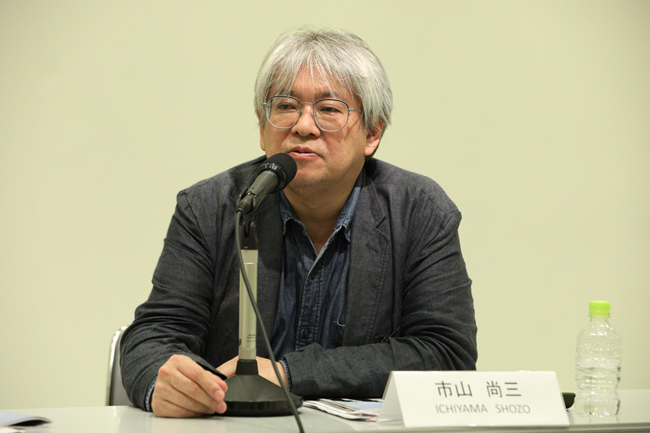Reflections on Filmic Exchanges in the Asian Region
Asako Fujioka (hereinafter Fujioka): "A Working Title: Training and Development Program for Film Screening Professionals" hosted by the Asia Center has held workshops for educating curators for several years. I have served as its advisor and coordinator. When things are done in English or collaboration is required, young Asians (except the Japanese) show an overwhelmingly high networking skill and quickly connect to one another. They are of course assisted by various digital tools. But not only that, they can lightly skip over the relationship in which the Japanese peculiarly feel defensive or reserved. In such an atmosphere I have seen participants lively growing. We have a lot to learn from Asia; not just communication, but how to actually put ideas into action. I am involved in a film festival myself, and Asians easily launch film festivals or workshops. Some filmmakers take the initiative in beginning something. An Indonesian producer visited mini-theatres across Japan. Immediately after returning to her country, she created a mini-theatre with her fellow in Jakarta. So, she wrote to me. They move fast, which greatly inspires us.
Ikeda: When it comes to learning from Asia, I always feel alarmed as Japan is increasingly left behind in Asia when I select participants for the Talents Tokyo or see Asian artworks at art exhibitions organized by the Asia Center. This is not just about mentality such as a passion for expression or communication skills; but if we do not learn harder from Asia, we will be left behind. I am keenly aware of this. What do you think of it?
Yasuoka: When the Institute calls for entries to international sessions, Japanese students are very reluctant to respond. Most of the applicants are Chinese, Korean, Thai, Malaysian, and other international students. Japanese should, I believe, go abroad more often. On the whole, Japan as a country is "reclusive". By encountering creators from Asia and the world, Japanese students can transform themselves. They can visit each other's country or might resolve to thoroughly study foreign languages again; in short, they will be strongly motivated to study. Such a place is very important.
Ikeda: Ms. Fujioka, do you have any other views on exchanges between Asia and Japan?
Fujioka: If you run such a project as mine, you must make it compulsory to publish the results. However, I always find it difficult to evaluate the results of human resources development. The completed films are of course important, but so are the processes. But how can you measure them? This is constantly on my mind. As what Japan regards as rightful results of human resources development or its successful cases differs from globally successful ones, Japanese philosophy is not the same as the world's. Japan needs to globalize its mindset.
Ikeda: We have just heard of China. In connection with China (in terms of human resources development in film), Jia Zhangke is encouraging and supporting a lot of young directors. Mr. Ichiyama, you have co-produced films with China and have many experiences with him through the TOKYO FILMeX. Do you have any thoughts on this?
Ichiyama: China has a great deal of people who want to engage themselves in film. The industry is gaining momentum. It has hits. People like producers who succeed in cinema are emerging. There are, to be sure, complicated problems such as censorship. But if you make a so-so film, you can collect money. This means that as online distributors are looking for film content, you can somehow manage to raise funds to produce a film with a production cost of about JPY100 million though you may not be able to release it at the theatre. In this regard, China has a lot of people who want to study film now. Film education is thriving more than Japan expects. There are a number of new film schools.
On the other hand, the Talents Tokyo has many applications from China, which are still less than those from Southeast Asia. Some Chinese producers are just content with producing films within China. It's the same as Japan. They often say that Japanese rarely go abroad as they prefer to make Japanese films in Japan. While Chinese filmmaking flourishes, very few people actively go abroad for co-production. As in Japan, there aren't many international negotiators. As more Chinese people participate in workshops, human resources that can make a difference will grow. The Talents Tokyo expects Chinese people to apply, but not many would.

Ikeda: Ms. Fujioka has often interacted with Southeast Asians who want to make films. Could you tell us about the production situation within their own countries or with their neighbors?
Fujioka: As they cannot raise funds for filmmaking in their own countries, they naturally go abroad. They search for a common language to do something creative, working together with international people. In Asia various funds and pitching forums are widespread. Japan hosts "Tokyo Docs",*5 a forum that supports the international co-production of documentaries every year. They actively participate in such a forum, and greedily study information on the Internet to absorb it. We have just heard of linguistic proficiency. Some Southeast Asians are good at language and others are necessarily not. They master it as they move. They take necessary action through which they master a tool, which is very Southeast Asian. I was granted a fellowship to inspect the status quo in both Myanmar and Cambodia. As in the case of the Talents Tokyo, they very actively apply for and acquire Western funds and make their way into Cannes.






